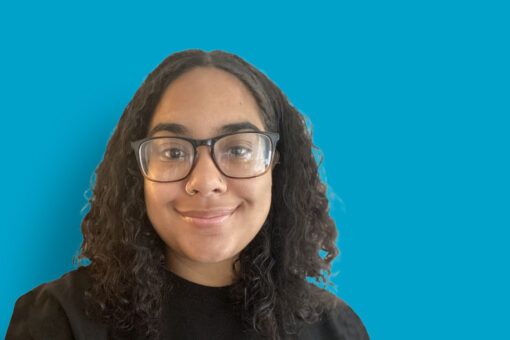
Quenelle Forbes graduated from our Ark Teacher Training programme last year. An English teacher, she shares her passion for the subject and love of reading with students at Ark Academy. We spoke to Quenelle during Black History Month,.as part of our #ArkPeople series.
Getting into teaching
I did an undergraduate degree in English and Philosophy and my Masters in Business Intelligence and Digital Marketing. I also love writing and have been running a blog since 2015.
Growing up, everyone told me I would be a teacher, but I rebelled against it and said it would never happen! However, after I finished my Master’s, I realised that teaching was something I wanted to get into, and I wanted to impact young people’s lives.
I came across Ark Teacher Training because my friend completed it in the previous year. It looked exciting, supportive and the training sounded very progressive. During my programme, I thought the anti-bias training was quite good. It was a real education for me on how to have specific conversations, address people and think more purposefully and professionally.
A love of reading
I’ve loved reading for as long as I can remember. My parents pushed us to read, and my mum often took us to the library. I’d always be taking books out of school and have this vivid memory of me being in Year 5 and reading books recommended for kids older than me.
I didn’t know many words, and my teacher was frustrated as I kept asking for the definitions, so she told me to write them down and use the dictionary. I have this massive folder of lined paper of all these words and all these definitions because I didn’t know what they were!
As I got older and started dissecting the text and understanding what they meant, it definitely left a mark on me. When I think about the skills I’ve gained from English, I know it’s a subject I love to teach.
Diversifying the curriculum and the classroom
When I think about the current curriculum, it simply doesn’t reflect the country as it is today. We don’t showcase enough books or poems that reflect our pupils, and we should rethink what is a ‘classic’ and broaden the field.
Growing up, many of my friends and I didn’t have many black teachers. Many of my peers feel that there isn’t a space for them. When we see things that have happened, like Child Q and how black boys get more fixed-term exclusions than their white counterparts, it doesn’t feel like there’s room for us, let alone to teach. The education system should focus on removing barriers stopping black people from entering the sector.
This year’s Black History Month theme is ‘Time for Change: Action Not Words,’ so I’d like to see the educational sector doing more, like showcasing programmes or training to encourage more diversity in the classrooms. We need to amplify black voices, and our peers need to become real allies.
We need to have more black networks across the country, and multi-academies could lead them to help remove the issues of going into teaching, such as imposter syndrome or microaggressions that some might face in the workplace. We could come together, socialise, and talk about education. We also need to invest in anti-racism training to raise awareness of the issues that non-white teachers and pupils face, ensuring schools can be safe environments for everyone.
Shaping lives
Sometimes I feel the pressure to excel as I educate young people, particularly those from the same background as me. When I come to school, I know I’m trying to give the best to my students who will face more obstacles.
I want them to leave school ready to do life and whatever success looks like to achieve it. I also try to be honest with my kids and what the real world is like; passing their English and maths is essential for whatever their next destination is.
We need black teachers to tell black pupils it’s okay to study to find their passion, and I tell my students to find what works for them so they can succeed. I also share how my experiences have shaped my path so far.
Spotlight on a Black British icon
Claudia Jones came to the UK in 1955, and she started the West Indian Gazette. It was a platform to amplify black voices in the community, share what was happening and a tool to reduce racial tensions at the time. It was an anti-racist newspaper campaigning for social equality and equity within the black community. I find that inspiring because it was the late 1950s when racial tensions were very high, and they had little funding for this newspaper. Unfortunately, the paper only lasted eight months after Claudia died, but they worked hard to get funding and keep her legacy going.
#Careergoals
I would love to stay at my school and within the Ark network. I’m interested in getting into curriculum leadership to help make changes that reflect our student body and help decolonise the curriculum. For now, I’m focussing on becoming a good teacher and giving students the education they deserve.